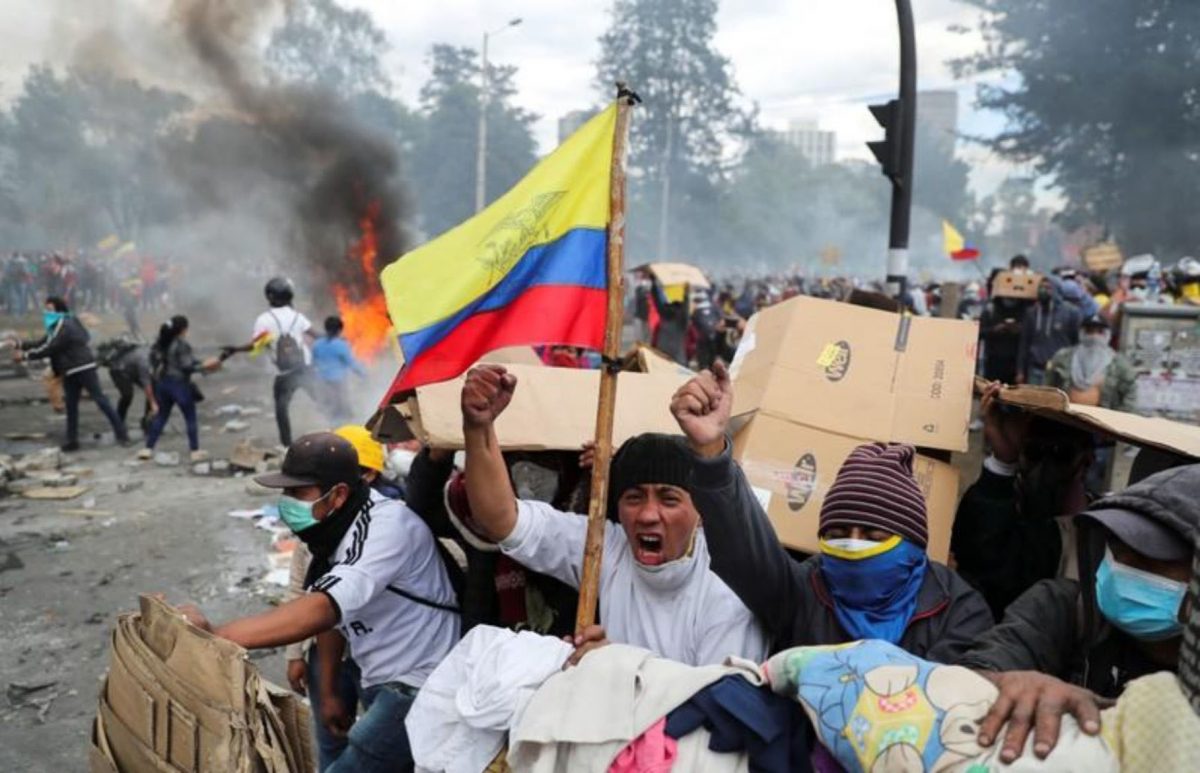QUITO (Reuters) – An indigenous group in Ecuador that has led protests for more than a week against a law that ended fuel subsidies said yesterday it has accepted direct talks with President Lenin Moreno, the first sign of a possible breakthrough in the dispute.
The highland capital of Quito was rocked by a 10th day of clashes over Moreno’s austerity plan, with the office of Ecuador’s comptroller set on fire and access roads to Quito’s airport blocked. TV channel Teleamazonas showed images of its own offices in flames and said its employees were unharmed.
In a televised message to the South American country of 17 million people, Moreno thanked indigenous leaders for agreeing to talks but did not comment on whether he would repeal the law.
Moreno also ordered a military-backed curfew in Quito and surrounding valleys starting at 3 pm (2000 GMT), blaming the violence on extremists whom he said had infiltrated protests.
“We’re going to restore order in all of Ecuador,” Moreno said. “We’re starting with the curfew in Quito.”
But the announcement of the curfew came within half an hour of its implementation, giving anti-austerity protesters, many of whom had traveled to the city from the provinces, little time to head home.
Conaie, an umbrella organisation for indigenous people in Ecuador, made the announcement about the talks with Moreno.
Ecuador’s ombudsman Freddy Carrion, who has been monitoring the conflict and encouraging dialogue, said Conaie’s leaders were unaware that Moreno planned to announce a curfew and said it could jeopardise talks.
“This measure looks like a desperate attempt by the government that will only worsen the violence,” said Carrion. He recommended Moreno suspend the subsidy cut immediately.
“It’s the only way to reduce violence” on both sides, Carrion said.
Conaie’s leaders could not immediately be reached for comment. A spokesman for a group that belongs to Conaie said its members were in an assembly and declined to provide immediate comment.
PUBLIC TALKS PROPOSED
Earlier yesterday, one of Conaie’s leaders told TV channel Ecuavisa that conditions for the talks included them being in public and having them broadcast.
“We’re not going to talk behind closed doors. It has to be with the Ecuadorean people,” Leonidas Iza said in broadcast comments. “There has to be large screens so every tiny input from our members can be heard.”
The mayor of Quito, Jorge Yunda, told Ecuavisa that Moreno’s government had decided to “analyse” the decree Moreno passed last week that cut the longstanding fuel subsidies.
Moreno, 66, had previously refused to repeal the law, defending it as a part of his efforts to rein in the fiscal deficit after signing a $4.2 billion loan deal with the International Monetary Fund (IMF).
The government did not immediately respond to requests for comment about whether he was open to repealing or revising the law. It released a video on Twitter in which Moreno is heard describing a country that regains peace and prosperity.
Before the curfew was imposed, downtown Quito resembled a war zone as plumes of tear gas clouded streets littered with bricks. Small fires burned and groups of people huddled behind walls and makeshift barricades for protection.
Ecuadorean TV showed images of the comptroller’s office enveloped in smoke. Thirty people were arrested at the multiple-story building, police said.
Five people have been killed in the unrest since it began on Oct. 3, according to Carrion’s office. More than a 1,100 people have been arrested and nearly 1,000 wounded, it said.
Some oil wells have been closed by protesters, curbing production of more than 1 million barrels of crude so far, the energy ministry said. A Chinese-owned copper mine also announced yesterday that it was limiting its operations as a precautionary measure.
Protesters have taken aim at the IMF and Moreno’s turn to the right since being elected in 2017 as the left-leaning successor to Rafael Correa.
Moreno moved his government base from Quito to the coastal city of Guayaquil earlier this week to escape the violence.
The unrest marks the latest flare-up in Latin America over economic issues. Argentine President Mauricio Macri was trounced in an August primary vote amid stiff opposition to an IMF deal he signed last year.





